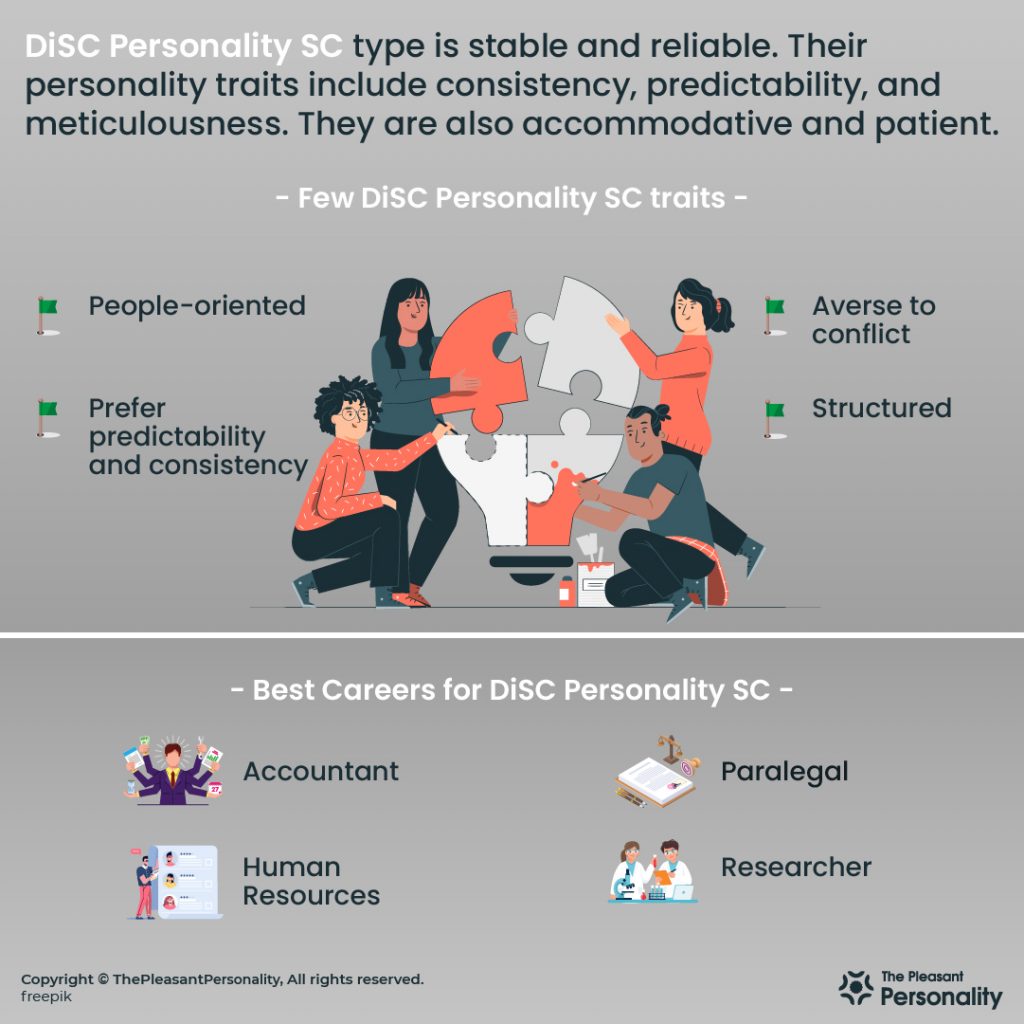DiSC personality SC type is a conscientious personality influenced by traits of steadiness. They are likely to score low on traits of dominance and influence on a DiSC test.
Individuals with this style and ISFJ of the Myers Briggs Type Indicator share many similarities.
As leaders, they are reliable and consistent. However, they tend to become rigid or overly cautious. Specifically, they are unwilling to change their status quo even when necessary.
DiSC Personality SC Infographic

DiSC Personality SC
SUMMARY
A DiSC personality SC type is known as the Stabilizer. They are stable, consistent, careful, diplomatic, and systematic. Also, they are modest, accommodating, and obliging.
Based on the DiSC model, the DiSC personality SC is an amalgamation of S (steadiness) and C (conscientiousness) traits. A common name for this personality is ‘Stabilizer.’
They prefer working in calm, stable environments and aim for steady progress in a systematic manner. On the other hand, they dislike uncertainties, chaotic situations, and time pressures.
When interacting with people, they tend to be diplomatic, modest, accommodating, and patient. They are averse to conflicts, so they are likely to oblige people’s requests a lot.
DiSC Personality Test SC
There are various free DiSC tests online. However, the original DiSC assessment is Everything DiSC, which, along with DiSC, are registered trademarks of John Wiley & Sons.
Based on this personality test, the following traits characterize an SC type.
1. They are people-oriented
A type SC personality is approachable. They make others feel comfortable. Additionally, they tend to provide support and guidance to their peers and subordinates.
In groups, they maintain harmony by collaborating peacefully. They are averse to conflicts, which makes them accommodating of people in most situations.
2. They prefer predictable and consistent situations
SC individuals desire predictability and consistency. They avoid taking risks and like to work in a structured, meticulous manner.
Sometimes, when a situation calls for risky decision-making, they delay it too much.
Another problem stems from their hesitance to try out new solutions. Being steady personalities, they are opposed to ideas that encourage novelty.
3. SC types are averse to conflicts
They actively avoid conflicts. Sometimes, it is important to resolve problems as and when they arise. However, they find it challenging to draw the line between being people-oriented and people-pleasing.
So, they go out of their way to be accommodating so as not to risk conflict. Along those lines, they are humble and reserved. They also hesitate to talk about personal accomplishments.
4. They are structured in their approach
Considering their conscientious and steady personality traits, this characteristic is unsurprising. They take a meticulous and organized approach to solving problems.
Moreover, they pay a high level of attention to detail.
Further, even in terms of helping others improve, they use a structured approach. Their decision-making skills involve thoroughly looking for low-risk solutions.
DiSC Personality SC Careers
Based on their personality traits, the SC style will flourish in the following career paths.
- Accountant
- Copy Editor
- Human Resources
- Paralegal
- Pharmacist
- Physician Assistant
- Quality Assurance Engineer
- Research Director
- Researcher
- Risk Management
- Scientist
- Service Technician
DiSC Personality SC at Work
Each DiSC type has particular preferences regarding the nature of their work and co-workers. They also get stressed and motivated by different factors.
In this section, you will understand the same for the DiSC personality SC type.
1. Nature of Work
DiSC personality SC types flourish in work environments that foster peace and harmony. Specifically, a work environment that promotes collaboration over competition is suitable for SC styles.
Moreover, they enjoy stability even in terms of daily routine. These individuals prefer tasks that require them to follow established rules or procedures. Additionally, they find it
pleasurable to work on activities that require planning.
So, a position that involves interactions and facilitation is perfect for an SC type.
On the other hand, they detest tasks that call for making quick decisions. They like being thorough, a practice that takes time.
So, when delegated work that urges them to make hasty choices, they experience frustration.
Additionally, they avoid working on multiple projects at once. They believe that it is important to carry out one task at a time. This way, the chances of making mistakes decrease significantly.
2. Nature of Co-workers
SC personalities work well with people who consider their inputs valuable.
They desire clear communication of expectations from their supervisors. Also, they prefer receiving accurate and direct feedback. They dislike it when their supervisors take a timid approach while critiquing their work.
Adding to that, they encourage their subordinates to ask logical questions. They dislike it when their subordinates make risky decisions without running it by them first.
As mentioned earlier, they love planning. So, they like it when their co-workers reach out to them to make arrangements for events.
Along those lines, they work well with colleagues who give them notice for meetings much ahead of time. On the flip side, they dislike invitations to last-minute or impromptu plans.
They tend to experience frustration when people push them into situations that make them feel uneasy.
Another roadblock in relationships stems from a lack of following through. Specifically, they dislike working with individuals who do not update them regularly.
Finally, peers who ignore problems, allowing these issues to fester, invoke agitation in SC types.
3. Sources of Stress
SC personality types are detail-oriented and prefer doing thorough work. Therefore, they experience distress when they need to delegate work. This is worse with tasks that require a great deal of analysis and accuracy.
As noted earlier, an SC DiSC profile is not fond of taking high risks. So, one source of stress involves ambiguous situations that call for risky decisions.
Similarly, tasks that require deciding quickly with a restricted amount of data stress them out.
It is true that this DiSC personality type enjoys getting accurate, straightforward feedback. With that said, they find it stressful when they receive too much critical feedback too frequently.
SC personalities prefer working in groups. So, if they are given sole and primary responsibility for large projects, they experience nervousness.
4. Incentives
Like CS personalities, the SC DiSC profile is fond of researching strategies that have helped successful people in the past. Their desire to produce quality work drives them to do so.
They prefer predictability and consistency in their work environment. One motivational factor involves decreasing risk through structure and detailed analysis.
A DiSC type SC personality also feels invigorated by helping others.
Specifically, they love mentoring people and offering one-on-one help. Being defined by steadiness and conscientiousness, they like to provide step-by-step instructions.
SC types are accommodating, patient, stable, and consistent. Therefore, they feel energized when they help people make plans. Considering these tendencies, you can say they are people-oriented.
Being a conscientious personality, they feel motivated by tasks that require drawing detailed reports. Along those lines, they prefer communicating through written means.
A Final Word from ThePleasantPersonality
The personal styles of the SC DiSC type include steadiness and conscientiousness. To function optimally, this type must work on becoming more open-minded. They can also try allowing people more freedom to work independently.
Further, they must recognize when they need to step up instead of seeking others’ approval. Likewise, it is important to set a deadline for important decisions.
If they struggle to come up with a solution by then, they can seek help from someone trustworthy.
Are you interested to know more about ‘DiSC Si Personality’ then click here?




